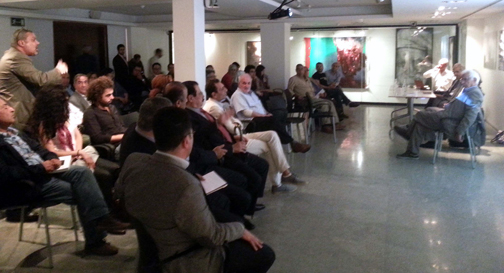London, Asharq Al-Awsat—The anti-government Syrian Writers Association held a launch party for the quarterly Awraq magazine on August 15. The event, held in central London’s P21 Gallery, was attended by several Syrian and Arab writers and intellectuals.
The magazine’s first issue came out last week, with a painting by Youssef Abdelke—who was recently released by the Assad regime—on its cover and an editorial written by Saddiq Jalal Al-Azm, the publication’s editor-in-chief.
In its cultural section, Awraq featured an article by the Palestinian intellectual Azmi Bishara entitled “Revolution and Transition.” Bishara raised several points about this serious stage in Syria’s history, concluding his article by saying: “The main guarantee to solve [these issues] is that societies participate in politics and public affairs in a manner that makes it impossible to hold back the tide of change.”
The issue also carried an interview with Lebanese author Amin Maalouf, who said that he feels happy to have witnessed the Arab Spring’s revolutions. In the interview, Maalouf emphasized that Islam corresponds to the values of democracy and secularism.
Slovenian philosopher Slavoj Žižek announced in an interview that “following the Arab revolutions, radical change in the world has become something possible.”
Uday Zu’bi did three interviews with Yassin Al-Haj Saleh, Bakr Sidqi and Hazem Nahar, three prominent Syrian activists and writers.
For his part, Al-Haj Saleh sent a message to Western politicians in which he begged them to “shut up! And stop being stupid and arrogant.”
Hazem Nahar said it was normal for Syrians return to their religious culture in an attempt to defend themselves.
The Syrian–German novelist Rafik Schami, who writes in German, wrote a study about a long-standing problem in Arab culture, namely the common disconnect between linguistic, religious and cultural discourses.
Adnan Abdul Razzaq wrote about the organized destruction of Syria’s economy, claiming that the futile slogan “Either Assad or we burn the country,” has cost Syria more than USD 50 billion.
The magazine ran a review by the Jordanian poet Amjad Nasser of Lisa Wedeen’s Ambiguities of Domination: Politics, Rhetorics and Symbols in Contemporary Syria. In his review, Nasser discussed several interesting points in the book, such as the author’s analysis of “Assad’s cult” and the role of image, as well as the regime’s security system in Syria.
Ezzedine Enaya, a Tunisian academic and writer, wrote an article he entitled “A Letter to My Christian Brother in Syria.” In this article, Enaya claims that “in the era of tyranny, our understanding of Christianity, as well as of Islam, has become [too] narrow. We found salvation in blotting out our memories.”
The Syrian film director and writer Haitham Hakki wrote about his city, Aleppo, and his experience in the civilian uprising in the city. which he documented in a film called “Aleppo . . . Some prefer it old.”
In a special interview, the Palestinian film director Hussam Assi spoke to Ben Affleck. Affleck said that while those working in Hollywood are accused of being extreme leftists, they are viewed as “chauvinistic Americans” outside the US.

